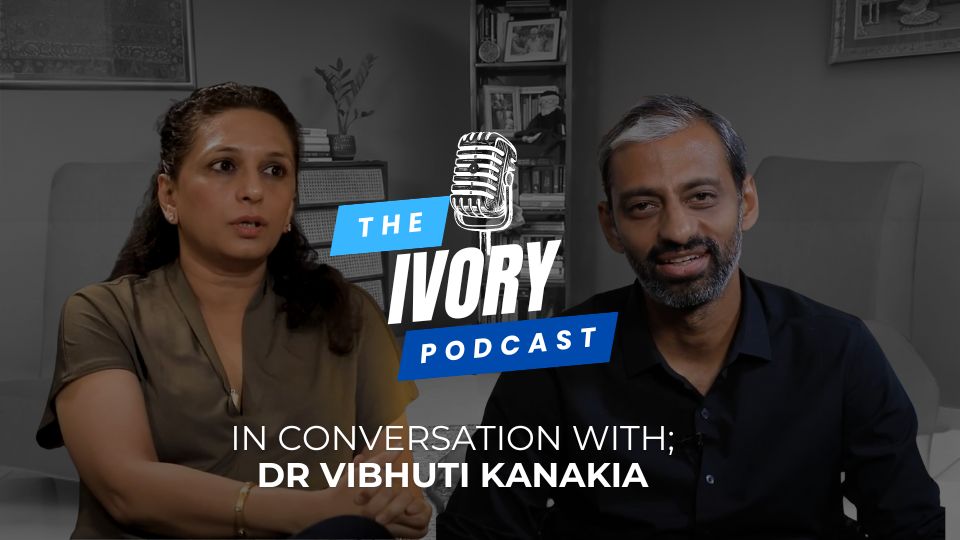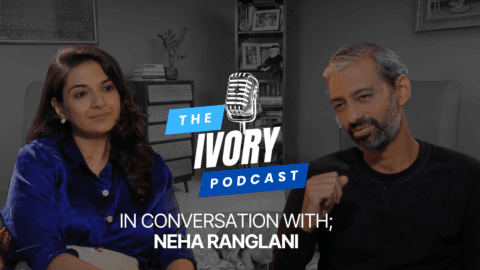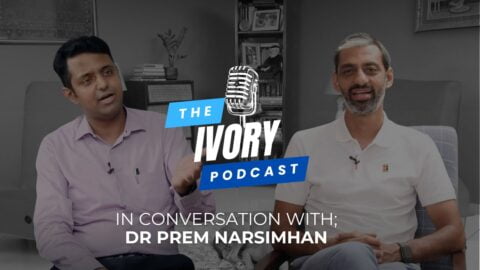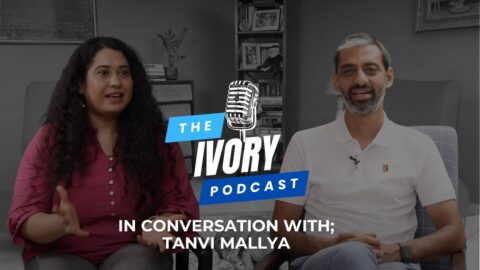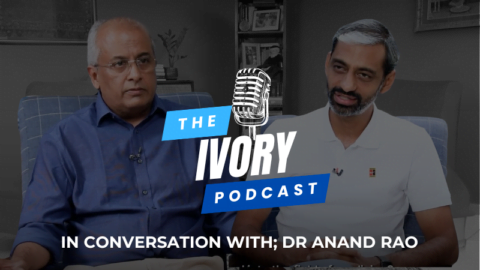First things first, what is the The Ivory Podcast?
“Is ageing gracefully really within our control?”
That’s the question at the heart of The Ivory Podcast. Most health podcasts in India seem to skip over a pretty important group. Yep, we’re talking about the young-at-heart crowd – the ones who’ve celebrated more birthdays than the rest of us.
We bring together a diverse mix of guests, including health coaches, nutritionists, psychologists, doctors, and business professionals. They share insights and truths about the ageing process. It’s not just talk; it’s about understanding what really happens as we grow older. So, join us on the Ivory Podcast. It’s like sitting down for a cup of tea with friends who know a thing or two about growing older gracefully and taking care of our brain health. Keeping this in mind we met with Dr Vibhuti Kanakia, a physiotherapist who deals with different and all kids of body pains. Let’s also understand her viewpoints on pain management for seniors.
Dr. Vibhuti Kanakia on body pain and remedies
Here is a little bit of what the Ivory team thinks about her:
Dr. Vibhuti Kanakia, a physiotherapist, through her diverse skill set, not only enhances the quality of life for older adults but also supports new mothers and athletes in achieving their physical health goals. Her practice emphasizes the importance of staying mobile and active, addressing common issues like back pain, osteoporosis, and joint health with a balanced approach. She believes that while ageing is inevitable, staying physically active can make the journey more comfortable and fulfilling. It’s also comes in handy at times in effective pain management for seniors.
Your approach to promoting mobility, recovery, and overall quality of life is evident in your work with patients of all ages.
With Gratitude,
Team Ivory
Now here is a little bit of what you should know about her work:
Dr. Vibhuti Kanakia is a renowned physiotherapist who focuses on holistic care for patients. She helps them manage pain, improve mobility, and recover from injuries. Her approach is rooted in evidence-based practices, emphasizing personalized care that considers each patient’s unique needs. Dr. Vibhuti is a strong advocate for active ageing, believing that age should not limit one’s ability to move and live independently.
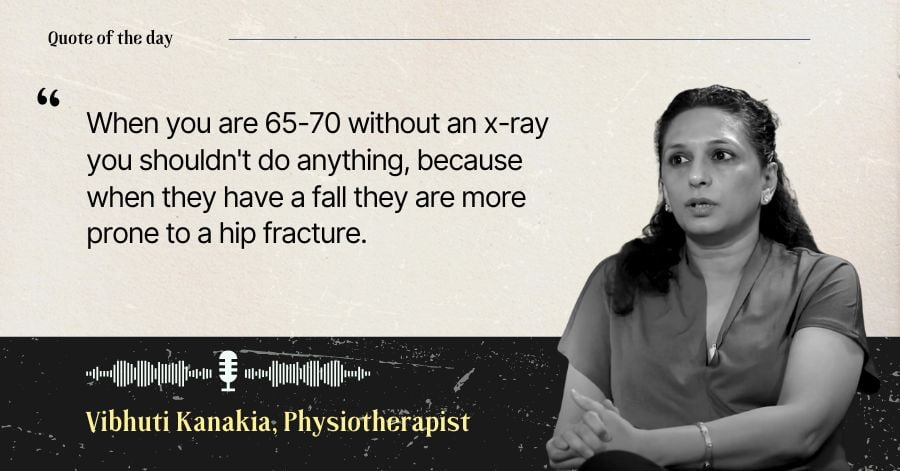
Let’s start 11 questions with Vibhuti:
Q: Dr. Vibhuti, can you share your go-to remedies when you wake up with a backache?
Dr. Vibhuti: When I wake up with a backache, I immediately try to pinpoint the cause. Instead of rushing for instant treatment, I let my body heal naturally. It’s important not to panic or seek immediate treatment unless absolutely necessary. I use ice on the affected area to reduce inflammation, sometimes combined with a painkiller spray or gel, and give my body a day to recover. If the pain persists beyond that, I start with stretches or visit my clinic for further assessment.
Q: You’ve mentioned icing as a recovery mechanism. What exactly happens when we apply ice to an aggravated area?
Dr. Vibhuti: Inflammation in the body is essentially swelling. The RICE method—Rest, Ice, Compression, Elevation—is highly effective. Ice plays a crucial role in reducing internal swelling by about 50%. The remaining 50% is addressed through therapy and treatment. Many people ask why ice and not heat packs. Ice is vital for acute pain and immediate inflammation, while heat packs work better for chronic conditions, improving blood flow but offering less immediate relief. This recovery mechanism also helps with effective pain management for seniors.
Q: Falls among older adults, especially in bathrooms, are quite common. What is your advice for those aged 65 or older in such situations?
Dr. Vibhuti: For individuals aged 65 and above, falls can often result in serious injuries, like hip fractures. At that age, bones are typically osteopenic, if not osteoporotic, which means they are prone to breaking even with minor falls. In such cases, I always recommend getting an X-ray immediately before doing anything else. I advise against applying ice or resting the injured area until a fracture is ruled out through proper medical evaluation. It’s important to ensure effective pain management for seniors who encounter any such situations.
Q: Osteoporosis is a concern as people age. How can one recognize and manage this condition?
Dr. Vibhuti: Osteoporosis occurs when the calcium level in the bones decreases, leading to weaker bones that are more prone to fractures. While taking calcium supplements can help, it’s impossible to entirely escape bone deterioration with age. It’s crucial for individuals in their 40s and 50s to strengthen their muscles through weight training, as strong muscles can support and protect weak bones. Additionally, women should start calcium supplements earlier, around 40, due to menopause, which accelerates calcium depletion.
Q: Women seem to face the effects of ageing on their bones earlier than men. Why is that?
Dr. Vibhuti: Women often hit menopause around the age of 45, which causes a drop in estrogen levels and accelerates calcium depletion. Estrogen plays a significant role in maintaining bone density. For men, calcium levels tend to decrease later in life, around age 50. That’s why women should start calcium supplementation by 40 or 45 at the latest, while men can begin at 50.
Q: In your practice, do you ever wish people had a toolkit of exercises or remedies they could use at home to manage common issues?
Dr. Vibhuti: Every individual’s body is unique, much like their DNA. For instance, ankle injuries can result from fractures, sprains, or ligament tears, and each requires a different approach. Back pain is another common issue that needs tailored exercises.
Q: Why are knee replacements more common now compared to earlier generations?
Dr. Vibhuti: Knee replacements are more common now due to lifestyle changes and the stress placed on knees by traditional Indian toilets, which require squatting. This position can cause more wear and tear on the joints, especially as people age. With advancements in medical technology and longer life expectancy, more people are opting for knee replacements to maintain their mobility and quality of life.
Q: How does menopause affect bone health, and what can women do to prepare?
Dr. Vibhuti: Menopause has a significant impact on calcium levels, which can accelerate bone loss. That’s why I recommend that women start taking calcium supplements earlier—around 40-45 years of age. This can help in mitigating some of the effects of menopause on bone density, making the transition smoother.
Q: Chronic pain can be very challenging to manage. What is your advice for those dealing with it?
Dr. Vibhuti: Chronic pain needs a deep understanding of its root cause. Lifestyle adjustments often play a big role in managing such pain. While many cases can be addressed through a structured therapy protocol, some might need ongoing physiotherapy or even surgical intervention. It’s all about finding the right balance and sticking to the treatment plan.
Q: How do you tailor your physiotherapy approach to individual needs?
Dr. Vibhuti: Every person’s body type, condition, and medical history are unique, so it’s essential to create a personalized exercise regimen. For example, someone with a sedentary lifestyle might need a different set of exercises compared to someone who has been active throughout their life. Customization ensures effective and safe recovery.
Q: Is there a connection between diabetes and frozen shoulder?
Dr. Vibhuti: Yes, absolutely. There is a direct link between diabetes and frozen shoulder. Diabetic patients are more prone to developing this condition due to changes in collagen structure. It’s important for them to maintain an exercise regimen focusing on upper body movements to keep the shoulders active and reduce the risk.
We’ve summarised this engaging podcast into a Q&A format to highlight the key insights for you including different methods to perform effective pain management for seniors. But if you’d like to experience the full conversation, you can listen to the entire episode here.
The Takeaway
In our engaging conversation with Dr. Vibhuti Kanakia, we explored a wide array of her expertise, spanning active aging, prenatal and postnatal care, and sports injuries. Her insights on managing pain, the role of physiotherapy in elder care, and the importance of maintaining mobility offer a refreshing perspective on ageing.
Dr. Vibhuti’s compassionate approach reminds us that while ageing may bring challenges, staying active and informed can make a world of difference.
Also read 11 best foods to boost your brain and memory
4
